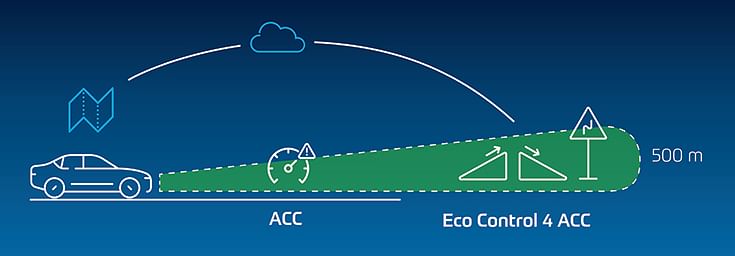ZF’s algorithm for greener mobility offers up to 8% more range in real-world driving
Model predictive control optimisation algorithm developed for software-defined vehicles uses information from the map and ADAS sensors, as well as powertrain know-how, to reduce the energy demand of the vehicle via a sustainable adaptive cruise control.
Assist systems such as adaptive cruise control can not only make driving more comfortable, but also enable energy savings and increase electric range through more efficient driving strategies. ZF has developed a predictive adaptive cruise control (ACC), ZF Eco Control 4 ACC, that enables up to eight percent more range.
A core component of this ACC add-on is a Model Predictive Control (MPC) optimization algorithm from Embotech. In particular, it evaluates in real time map information such as uphill and downhill gradients and curves, as well as in-vehicle information about the optimal operating points of the powertrain.
Successful field tests by ZF have shown that Eco Control 4 ACC can achieve a range gain of up to 8% in real-world traffic. As an add-on function for series ACCs, it can be used in both passenger cars and commercial vehicles, regardless of the type of powertrain. “Eco Control 4 ACC is a ground-breaking development that brings us a significant step closer to Vision Zero emissions,” said Uwe Class, Vice President Advanced Systems Development at ZF. “Above all, this solution is practical for everyday use and available for series production.”
Alexander Domahidi, Embotech’s CTO and Cofounder added: “Eco Control 4 ACC is a game-changer in CO2 emissions reductions. The saving potential of up to eight percent with ‘just a piece of code’ is a giant step forward to revolutionize greener mobility and transportation. This is one proof point for Embotech’s commitment to offer autonomous software solutions that make our customers’ technology more sustainable.”
 Model predictive control optimisation algorithm developed for SDVs uses information from the map and ADAS sensors, as well as powertrain know-how, to reduce energy demand via a sustainable adaptive cruise control.
Model predictive control optimisation algorithm developed for SDVs uses information from the map and ADAS sensors, as well as powertrain know-how, to reduce energy demand via a sustainable adaptive cruise control.
Algorithm maximises efficiency or minimises travel time
The basis for the optimum driving strategy is the individual decision of the respective driver as to whether the predictive cruise control should maximise efficiency or minimise travel times. A balanced mix of the two strategies is also possible. In addition, the assistance system orients itself as best as possible to the speed set by the driver. Based on these pre-settings, everything else runs automatically.
The algorithm now continuously evaluates the map data in the navigation system and the operating data of the powertrain system for the next 500 metres. This means that information about the following uphill and downhill gradients, curves or speed restrictions is continuously incorporated into the evaluation, and the assistance system attempts to balance time and energy in the best possible way. In contrast to conventional adaptive cruise control systems, this control system is not rigidly rule-based: In the optimization, the software weighs all of the default settings against all possible use cases in a 500-meter horizon simultaneously and in real time. In addition, the system uses the powertrain's efficiency maps to optimise the current operating point.
Here, the competencies of ZF and Embotech complement each other perfectly: while ZF can provide the appropriate information for the assistance system from its system understanding of the entire vehicle and control the acceleration and braking, Embotech contributes its deep understanding of the appropriate algorithms for real-time evaluation of this data and its embedded solutions.
All in all, the two partners have developed a system that gives drivers higher range and lower operating costs without sacrificing comfort and can thus sustainably reduce the burden on the environment. The spectrum of possible applications that ZF can serve ranges from passenger cars to buses and heavy commercial vehicles.
RELATED ARTICLES
Autoliv Plans JV for Advanced Safety Electronics With China’s HSAE
The new joint venture, which is to be located strategically near Shanghai and close to several existing Autoliv sites in...
JLR to Restart Production Over a Month After September Hacking
Manufacturing operations at the Tata Group-owned British luxury car and SUV manufacturer were shut down following a cybe...
BYD UK Sales Jump 880% in September to 11,271 units
Sales record sets the UK apart as the largest international market for BYD outside of China for the first time. The Seal...






 By Autocar Professional Bureau
By Autocar Professional Bureau
 19 Aug 2023
19 Aug 2023
 4460 Views
4460 Views





 Ajit Dalvi
Ajit Dalvi




